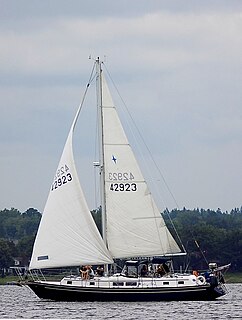
The C&C 35, also called the Redwing 35, is a Canadian sailboat, that was designed by Cuthbertson & Cassian and first built in 1969.

The C&C 33 is a series of Canadian sailboats, that were designed by Robert W. Ball of C&C Design and first built in 1974.

The C&C 38 is a series of Canadian sailboats, that were all designed by C&C Design and first built in 1973.
The C&C 40 is a series of Canadian sailboats, that were all designed by C&C Design and first built in 1968.

The Beneteau First 25S is a French sailboat, that was designed by Group Finot/Conq and first built in 2008.
The Beneteau First 25.7 is a French sailboat, that was designed by Group Finot and first built in 2004.
The C&C 41 is a Canadian sailboat, that was designed by Robert W. Ball at the request of Jim Plaxton, who had purchased C&C Yachts in 1981. Plaxton wanted an International Offshore Rule racer and the resulting design went into production in 1981.
The C&C 44 and the C&C 44 Custom are a series of Canadian sailboats, that were designed by Robert W. Ball and first built in 1985.

The Northwind 29 is a Canadian sailboat that was designed by C&C Design and first built in 1969.

The Gulfstar 43 is an American sailboat that was designed by Vince and Richard Lazarra as a cruiser and first built in 1971.
The Dockrell 37 is a British sailboat that was designed by Dockrell Yachts as a cruiser and first built in 1981.
The Cal 39 is an American sailboat that was designed by C. William Lapworth as a racer-cruiser and first built in 1970. The boat was introduced just before the adoption of the International Offshore Rule (IOR) for racing and, as a consequence of not meeting that rule, saw low sales numbers. It was not in production long and was replaced by the Cal 39 Mark II.
The Freedom 39, also called the Freedom 39 Express, is an American sailboat that was designed by Ron Holland and Gary Hoyt as a cruiser and first built in 1983.
The Baltic 40 is a Finnish sailboat that was designed by Judel/Vrolijk & Co. as an International Offshore Rule racer-cruiser and first built in 1988.
The Islander 40 is an American sailboat that was designed by Doug Peterson as a racer-cruiser and first built in 1979.
The Nordic 40 is an American sailboat that was designed by Robert Perry as a racer-cruiser and first built in 1978.
The Nordic 44 is an American sailboat that was designed by Robert Perry as a racer-cruiser and first built in 1980.
The Bristol 40 is an American sailboat that was designed by Ted Hood as a racer-cruiser and first built in 1970.
The Bermuda 40 is an American sailboat that was designed by William Tripp, Jr. in 1958 as a racer-cruiser and first built in 1959.
The Westwind 24, also called the Paceship P 24, is a Canadian trailerable sailboat that was designed by Ted Hood as a cruiser and first built in 1966.






